|
|
|
|
|
|
|
|
|
|
|
|
|
 |
 |
 |
 |
|
 |
 |
|
|
 |
 |
 |
 |
|
 |
 |
 |
 |
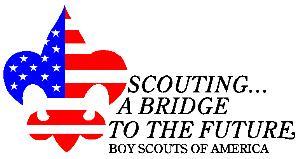
|
Scouting is unlike anything your son has ever experienced before.
Unlike school, organized sports, or perhaps even in the home setting, in
a Boy Scout troop the youth are the ones who are in charge. THEIR
desires become our agenda. THEIR ideas for adventure, fun, and
excitement are what the adults guide them to bring into reality. In
Scouting, THEY speak and the adults listen.
By practicing representative democracy, they pick their own leaders who
form the "Patrol Leader Council" that creates the yearly agenda. Scouts
work together on every issue, from what to eat at camp, deciding who
will wash dishes and shop for food, they learn and PUT INTO PRACTICE
communication, public speaking, teamwork, conflict resolution, and
leadership.
By taking advantage of any of the 130 possible merit badges, they gain
exposure to areas of interest ranging from Rifle Shooting to Chemistry,
from Small Boat Sailing to Aviation, and from Reading to Nuclear
Science. Statistically, the Merit Badge program often leads to
life-long hobbies and even career choices. At a minimum, Merit Badges
help a young man try things he may never have had a chance to do if not
for the Scouting experience, such as rifle shooting, archery, sailing,
or camping.
While boys are busy "being Scouts" and having fun, they start to embody
the virtues of Scouting defined in the Scout Oath and Law.
What is Scouting? It's "fun with a purpose".
|
|
 |
 |
|
 |
 |
 |
 |
 |
 |
 |
 |
|
 |
 |
 |
 |
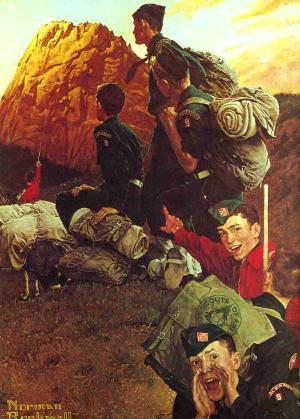
|
The
Boy Scout Of America Program is a 100 year old, professionally crafted,
program of education and character development. By using the "Outdoor
Method" (camping, fishing, rock climbing, etc) boys work together to do
"the things boys like to do". In the process, they learn the value of
teamwork, honesty, communication, mutual respect, and more as they work
towards their goal and overcome any obstacles they encounter.
By employing the Methods of Scouting, we reinforce the AIMS of Scouting,
which are reflected in our Oath and Law. The goal is to see that they
become permanant fixtures in the character of each Boy Scout as we teach
them to be Trustworthy, Loyal, Helpful, Friendly, Courteous, Kind,
Obedient, Cheerful, Thrift, Brave, Clean, and Reverent.
|
|
 |
 |
|
 |
 |
 |
 |
 |
 |
 |
 |
|
 |
 |
 |
 |
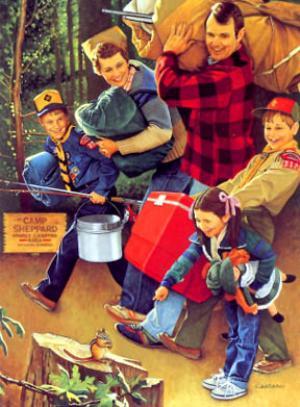
|
Camping trips usually follow the following format.
We do our last check during the meeting on the Tuesday the week before
we leave, The troop trailer is readied for the trip and food assigments are given out the Tuesday of the week they are leaving for the trip. Eacg scout will be assigned something to bring.
Scouts arrive at the Scout Hut parking lot Class B or causal clothing on a Friday
evening, typically by 5:00 PM. Once all gear is packed and a final
check for permission slips and medications is complete, we will depart
for the selected camping destination.
Upon arrival, the first order of business is to choose camp sites and
set up tents. Once all tents are up, kitchen/cook areas are set up and
all personal gear is stowed. Scouts can have free time. All scouts need to have eaten prior to being drop off on Friday night or they need to bring supper with them. Scouts will prepared all meals on Saturday and Sunday morning usually is something quick as all scouts are usally gone by 10am.
Saturday mornings begin with the designated cooks waking up and starting to prepare breakfast. At
reveille, the rest of the camp will rise and patrols are encouraged to
eat together. Each patrol will have their own dining area, designated
tables. Once KP (Kitchen Police, The dishes ) is complete, activites are to begin if any is planned.
We ask that you check with your scout and make sure he has all his gear
when we get home. We will store and clean some equipment before we
release the Boys to go home. We also ask parents to please check your
scout for bites or Tics, everytime we go out someone gets one.
|
|
 |
 |
|
 |
 |
 |
 |
 |
 |
 |
 |
|
 |
 |
 |
| |
|
|
First time members pay a $25.00 fee for their initial
sign-up.
There is a modest "food fee" for each weekly meeting.
Fund Raisers are held as needed to fund new equipment or more elaborate
camping destinations.
==================
The Activity Fee - helps to pay for annual
registration, Boys Life Magazine subscription, numberous awards, badges,
pins, camp ground fees, and more. It usually is NOT enough for all
expenses (see fund raising below).
==================
Summer Camp Fee - Week-long Summer Camp is a great
experience, and we encourage Scouts to attend every year. The average
fee is $200. Please start saving for this NOW so that Camp is not a
"financial burden" when payment is due (usually May of each year).And please apply for a campership from the council.
==================
Fund Raising - held as needed to suppliment the cost of
running the Troop. Covers new/replacment equipment (tents, stoves,
cook gear, propane tanks, etc), or to cover the cost of more elaborate
camping destinations.
|
|
 |
 |
|
 |
 |
 |
 |
 |
 |
 |
 |
|
 |
 |
 |
 |
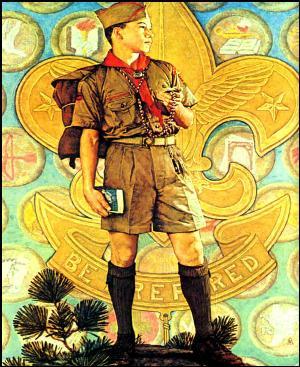
|
Scouting's
founder, Lord Baden Powell realized long ago, that when people look the
same (uniform), they not only show they are members of an organization,
but being dressed the same ERASES all trace of "class" or "wealth" or
"social status".
In Scouting, all are equal and treat each other with respect. In doing
so, we learn to look past class, income, race, religion, nationality,
and social status.
Despite the attacks from some of Scouting's detractors, there has never
been a program so OPEN and SUPPORTIVE of diversity as Scouting.
Considering this was taken into account in 1907, Lord Baden Powell was clearly a man ahead of his time.
|
|
 |
 |
|
 |
 |
 |
 |
 |
 |
 |
 |
|
 |
 |
 |
 |
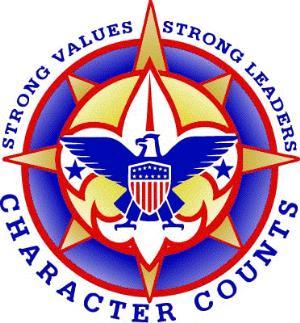
|
We certainly won't send the "Scout Police" out to find you if you
don't show up, but you miss out on a big part of the BSA Program if you
don't attend regularly.
Scouting is NOT just playtime, or "Johnny's weekend fun" away from his
kid sister. Scouting is a carefully crafted character-development
program. Each boy is a member of a PATROL, and as such, is part of a
smaller group (as compared to the whole Troop of boys) where he is given
AMPLE opportunity to play an active and valuable "hands on" role in the
patrol's success.
A boy who shows up sporadically DEPRIVES himself of the chance to
make key decisions within his patrol; choose trip ideas and
destinations, make menu selections, divy out workload, and build close
friendships. Every meeting includes a period of valuable skill
instruction and fun interpatrol competitions that relate to the upcoming
camping trip. If a boys misses a meeting, he will find himself less
prepared for the upcoming weekend in the outdoors. The troop meetings
are where we "learn", but the camping trip is where we reinforce the
skills by putting them into practical use.
Scouts should make every effort to attend meetings on a regular basis.
Those who don't are missing out on the full experience of their limited
Scouting years, and are causing their patrol members to do the same.
We do ask that if you have a family problem and he cannot make the
meeting please let us know, Your son should contact his Patrol Leader or
the Senior Patrol Leader and let them know.
|
|
 |
 |
|
 |
 |
 |
 |
 |
 |
 |
 |
|
 |
 |
 |
 |

|
|
Rank is an interesting word choice, clearly derived from Scouting's origin as a program modeled after a military structure.
Those holding a "higher rank" do not order
around those of "lower rank". In Scouting, the term "rank" is a
PERSONAL measure of his progress along the "Trail to Eagle"... or more
appropriately thought of as his "trail to manhood".
When a boy joins Scouting, his first POSITION is one of "Scout".
He then works on the first 3 RANKS; Tenderfoot, 2nd Class, and 1st Class. Within the requirements of these ranks, a Scout learns the SAFETY aspects
of Scouting; basic first aid, how to choose a safe camp spot, how to
properly dress for an outing, how to find his way with map/compass, what
to do if he gets lost, etc...
Now a demonstrated
"safe" Scout... he is ready for his next period of personal development,
which is LEADERSHIP. In the pursuit of Star, Life, and Eagle,
a youth is learning (and then mastering) the skills of leadership. By
holding leadership positions within the troop, he learns to lead,
instruct, and inspire others. He learns to "give back" to others, and
also learns his emerging place in Society as a citizen.
There are 121 various Merit Badges
available (only 21 needed for Eagle). To ensure that the Scouts are
getting a taste of the opportunities available, the higher badges of
rank require a set number of merit badges be completed (including some
designated as "Eagle required").
Merit Badges offer
exposure to a diverse background of interests, adventures, and
opportunities that Scouts may never experience IF NOT for the Scouting
program (Aviation, Scuba, Reptile study, shooting sports, etc). It is
not uncommon that exposure to a topic via the Merit Badge Program leads
to life-long hobbies and career choices, as well as "needed skills"
like Home Repair, Auto Mechanics, and Public Speaking.
There is no limit on the number of Merit Badges a youth may earn
|
|
|
|
 |
 |
|
 |
 |
 |
|
|
 |
 |
|
 |
 |
 |
 |
 |
 |
 |
 |
|
 |
 |
 |
 |
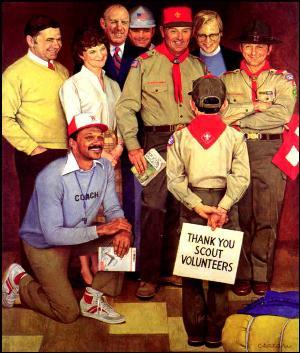
|
Court of Honor
The
court of honor is a formal recognition of the Scout’s achievements,
with family and friends attending. It is designed to publicly recognize
the hard work and achievement of those Scouts earning awards. In
Troop 516 courts of honor are held the week following boards of review.
The troop makes courts of honor special by holding them in a dignified
manner with special ceremonies. Refreshments are served afterwards to
provide a social setting for the troop to celebrate each other’s
accomplishments.
While the court of honor is a special event, it is important to Scouts are recognized immediately for their achievements. Thus,
the troop follows BSA’s suggestion to award new badges to Scouts as
soon as possible after the awards have been earned, usually in the next
troop meeting. Awards earned are not held until the next court of honor.
· Scouts receiving awards between courts of honor will:
o Receive their badge and completed blue card at the next troop meeting.
o Receive their white merit badge record card and be recognized at the next court of honor.
· Scouts
receiving awards resulting from boards of review will receive their
award, blue card, and white record card at the next court of honor.
Questions
How often are courts of honor held in Troop 501?
About every six months. Please check the troop calendar for exact dates.
Where are courts of honor held?
They are held at the Scout Hut .
How long does a court of honor last?
Usually
there is a troop meeting that is followed by the court of honor. The
court lasts from 30-45 minutes. Eagle Scout courts of honor last 60-90
minutes, including refreshments.
Who runs the court of honor?
Many people are involved in putting on a successful court of honor:
· That night –
o The Scoutmaster
hands out rank awards to all Scouts and merit badges earned by the
senior patrol leader. He also awards troop awards (e.g., ribbons that
are hung on the troop flag).
o The Senior Patrol Leader hands out merit badges earned by the patrol leaders and the assistant senior patrol leader.
o Patrol leaders hand out merit badges earned by the members of their patrol.
o The Committee Chair arranges for refreshments (snacks and drinks).
· Behind the scenes, leading up to that night –
o The Scoutmaster conducts Scoutmaster conferences.
o The Advancement Chair sets up boards of review.
o Various adults in the troop conduct boards of review.
o The Advancement chair
collects completed merit badge blue cards, buys badges, completes the
white record cards, gives these materials to the Scoutmaster for
presentation, and tells the Committee Chairman which Scouts have
advanced.
o The Advancement Chair records / puts new advancement data into the computer.
Who can come to a court of honor?
The
troop encourages a strong turnout from parents, other family members,
and friends to show support for the Scouts earning awards. Even if your
son isn’t recognized at a court of honor, your presence may encourage
him and others to keep striving.
What’s an Eagle Scout court of honor like?
Because
of the special nature of these ceremonies, Eagle Scout courts of honor
are separate events. They are not held in conjunction with regular troop
courts of honor. The Eagle Scout, his parents, and various troop
members carefully plan a scripted, dignified event to recognize the
Eagle Scout as earning Scouting’s highest award. Preparation of the
ceremony may take many weeks, and is individually developed to reflect
the style of ceremony the Scout and his parents would like. Outside
speakers are often part of the program. The Eagle Scout’s family usually
prints invitations and programs on special Eagle Scout stationery
purchased at the Scout Shop. The court is usually followed by a buffet
dinner.with food prepared, brought, and served by many troop families.
Everyone in the troop is invited to attend this special event.
|
|
 |
 |
|
 |
 |
 |
 |
 |
 |
 |
 |
|
 |
 |
 |
 |
|
|
Test Your Skills!
Court of Honor
True or false –
Always wait until the next court of honor to present award to a Scout.
False.
Immediate gratification is important to boys. Awards should always be
presented as soon as possible after the Scout earns them. Scouts should
be recognized at the next court of honor, but awards should not be held
until then.
No one should attend a court of honor except the Scouts receiving awards.
False.
Everyone in the troop should attend to show support for the boys
earning awards and for the troop program. Parents, other family, and
friends are encouraged to come.
An Eagle Scout court of honor should be planned like any other court of honor.
False. Eagle courts of honor are separate events, requiring significant advance preparation.
|
|
 |
 |
|
 |
 |
 |
 |
 |
 |
 |
 |
|
 |
 |
 |
 |
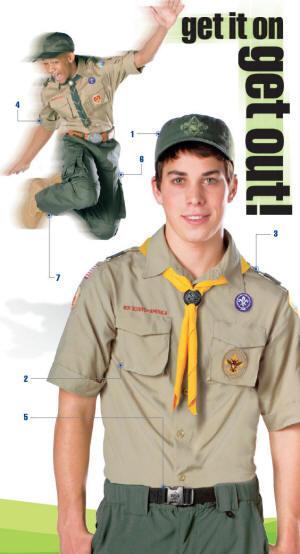
|
Officially,
the BSA has ONE uniform, and any historical version of it is acceptable
(once official, always official). It is found in the front pages of
every Scout Handbook.
The official BSA uniform is comprised of:
a troop-issued hat *
a troop neckerchief *
BSA tan shirt (with patches placed in the proper spots)
a Merit Badge Sash **
BSA olive pants
BSA web belt w/ buckle
BSA socks
This is THE official uniform, but in many pieces of BSA literature it may be referred to as the FIELD uniform, or commonly, the "Class A" (a military term the BSA prefers NOT to use as the BSA does not wish to be perceived as a paramilitary organization).
* Technically, hats and neckerchiefs (and
how they are worn) are optional in the BSA Uniform Guide, but if the
wearing of either is adopted by a troop, they are then considered
official components of the uniform. We wear both. The hat is the
"baseball cap" variety imprinted with our troop number, and the
neckerchief bearing our logo is to be worn UNDER the collar with the top
button of the shirt unbuttoned.
** The Merit Badge Sash,
worn over the right shoulder, is impractical for most Scouting-related
activities. It is therefore only worn at ceremonial events or select
meetings such as a Court of Honor.
It is not always
practical to wear the Field Uniform shirt every minute a Scout is
involved in a scouting-related activity. The BSA offers a variety of
polo-type shirts and tee shirts imprinted with BSA logos, and many
troops (ours included) often opt to have custom printed shirts made.
It is customary practice
that when a troop (as a whole) agrees on a standard shirt, they will
opt to wear it INSTEAD of the BSA olive shirt, and in many items of BSA
literature, this will be referred to as an ACTIVITY uniform, or sticking with military nomenclature, " Class B".
Historically, the BSA
offers major redesigns to the uniform about every 20 years. This past
year, the BSA announced the "Centennial Uniform" with "switchback" pants
and some color changes to troop number decals and shoulder loops.
This is the 5th major redesign in the BSA's 100 year history.
|
|
|
|
 |
 |
|
 |
 |
 |
|
|
 |
 |
|
 |
 |
 |
 |
 |
 |
 |
 |
|
 |
 |
 |
 |
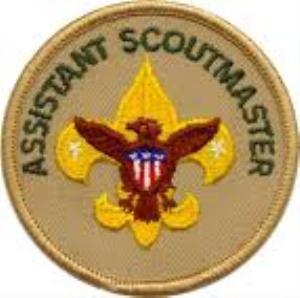
|
All
are welcome to contribute as much as they would like as a uniformed
leader, Committee Member, or a Merit Badge Counselor (MBC).
As a Committee Member, you should be willing to attend
the monthly Committee Meeting and get involved in as much/little
upcoming activities as you wish.
As a Merit Badge Counselor, you choose to provide
counseling from 1 to many of the available 121 Merit Badges. YOU DO NOT
need to be an "expert" to be a counselor, as the Merit Badge handbooks
will cover ALL that you need to know to learn/teach each particular
badge.
As a Merit Badge Counselor, your time is ONLY used "upon request" when a
Scout decides he would like to work on a particular badge for which
you've agreed to be a counselor. Merit Badges are earned OUTSIDE of the
weekly meeting, so Scouts meet with you ON YOUR SCHEDULE of
availability.
NOTE.. all leaders MUST complete a BSA Adult Application, which requires you to provide your Social Security Number.
A background check will be done by the Middle Tennessee Council. WE
(Troop) will NOT know of the particular details of anyone's record, but
will simply be told "yes/no" regarding your eligibility. If you do not provide your SSN, you will not be accepted as a leader. This is National BSA policy, not an ad hoc policy of Troop 501. All adults leaders must take the on-line class on Youth Protection prior to working with the Boy Scout youth. And this MUST be done within 30 days of applying to be a leader or any part of the BSA.
|
|
 |
 |
|
 |
 |
 |
 |
|
|
|
|
|
|
|
|
|
 |
 |
|
|
|
|
 |
 |
|
 |
 |
 |
 |
|
|
|
|
|
|
|
|
|